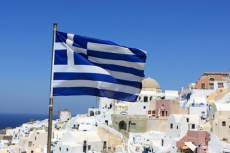
What’s so special about Greek culture, I hear you ask? What makes Greece different to other Mediterranean countries, like Italy or Spain? The Greek people are some of the friendliest in Europe, willing to go the extra mile for a stranger or for a friend. They’re generally pretty sociable people, so rather than the usual 2-word conversation you’ll have with a stranger here, you might often be asked questions about where you’re from, what you like about Greece so far, and what your favourite thing is.
On your holidays to Greece (if you’ve been), you’ve probably noticed that everybody is louder and more lively than back in the UK. Of course, there are the usual people who try and tempt you into their shop or restaurant, but at the end of the day they’re just doing their job. Especially with the current financial situation in Greece being so tough, you can’t really blame them, even if they are annoying.
Once you get to know the Greeks, though, you’ll find them very warm-hearted and welcoming. Family is of the utmost importance to many people, and looking after their elderly relatives is as concerning as looking after children. The family sizes are bigger compared to the smaller ones people have here, and on average the working hours are less, so you have more time to spend with them! Having some really good friends is also essential to many Greeks, as you need somebody to go for a coffee with and chat about life/politics/the world with. Socialising is a great way to pass the time.
The Greeks also have an international reputation for their hospitality, called φιλοξενία “filoxen-ee-a” in Greek. This literally means love of guests/strangers, and it’s something that is deeply ingrained in the mentality of many Greeks. Hotels are called ξενοδοχείο “xenodo-hee-oh”, which you can see also includes the word for guest/stranger. So, if you go to Greece and are wondering why you’re being so well treated, it’s because the language basically encourages it!
In Greece, as you might well expect, there is a really big pride in their ancient past. Landmarks like the Parthenon, Acropolis and Delphi have become world-famous, and they’re the staple photograph on any Greek postcard. As the nation that “invented” democracy in Western Europe, they are very proud of this, and they won’t let us forget that we owe our civilisation to them in a hurry!
As well as their ancient past, though, their recent past has been very influential upon culture. The fact that Greece is now made up of various islands, bits of the mainland and even the spread of Greek culture to Cyprus means that Greece is hugely diverse. No one region is the same. For example, whilst people from Athens might be urban and cosmopolitan, the majority of Cretans consider themselves to be a little different from most mainland Greeks. Crete even has its own unique literary culture, and has produced writers like El Greco and Nikos Kazantzakis, the author of Zorba the Greek. A phrase of his sums up the Greek way of thinking very nicely – “I hope for nothing, I fear nothing, I am free”.
Image from: https://www.vintagetravel.co.uk/blog/visit-crete-for-greece-independence-day/

0 Comment:
Be the first one to comment on this article.